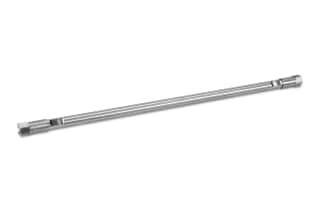
|
Chemistry |
C18 |
|
Separation Mode |
Reversed Phase |
|
Particle Substrate |
Silica |
|
pH Range Min |
2 pH |
|
pH Range Max |
8 pH |
|
Maximum Pressure |
6000 psi (415 Bar) |
|
Endcapped |
Yes |
|
Bonding Technology |
T3 |
|
Silanol Activity |
Medium |
|
Particle Shape |
Spherical |
|
Particle Size |
5 µm |
|
Endfitting Type |
Waters |
|
Pore Size |
100 Å |
|
Format |
Method Validation Kit |
|
Surface Area |
330 |
|
System |
HPLC |
|
Particle Technology |
Silica |
|
USP Classification |
L1 |
|
Inner Diameter |
4.6 mm |
|
Length |
250 mm |
|
Carbon Load |
14 % |
|
UNSPSC |
41115709 |
|
Brand |
Atlantis |
|
Product Type |
Column Kits |
|
Units per Package |
3 pk |

Atlantis Silica T3 Method Validation Kit, 100Å, 5 µm, 4.6 mm X 250 mm, 3/pk
A trifunctional C18 alkyl phase is used in the Atlantis T3 Column's innovative T3 bonding technique, which is bonded at a ligand density that encourages polar compound retention and compatibility with water mobile phases. When compared to the conventional trimethyl silane (TMS) end-capping, the patented T3 end-capping method is significantly more efficient. You get better polar compound retention and aqueous compatibility when the special end-capping and T3 bonding are combined.
The Atlantis T3 Columns present in the Atlantis Silica T3 Method Validation Kit are a great substitute for conventional C18 reversed-phase LC columns because they provide greater performance over a wider pH range, and exceptional retention of and selectivity for neutral, hydrophobic chemicals in addition to polar analytes. The lab equipment delivers improved column performance, longevity, peak shape, and stability in addition to these exceptional qualities.
Utilize the Atlantis Silica T3 Method Validation Kit for simple polar compound retention and separation. This essential lab equipment is created to offer superior peak shapes for amine-containing bases at pH 7 as well as longer lives at low pH. Because of this, you can rely on the Atlantis Silica T3 Method Validation Kit to deliver exceptional performance with the analytical column over a broad pH range. These are universal reversed-phase C18 lab equipment based on silica that may be utilized in a range of applications and allows you to retain and separate highly polar chemicals. They provide exceptional retention and selectivity for neutral, hydrophobic chemicals in addition to polar analytes.
Extend the lifetime of your column by using the Atlantis Silica T3 VanGuard Cartridge, 100Å, 5 µm, 3.9 mm X 5 mm, 3/pk. Made using the exact packing materials that are in the column, the cartridge functions by filtering out any particulate or chemical pollutants that may enter the mobile phase. This has multi-fold benefits. It increases the accuracy of the analysis results while extending the lifetime of the column, reducing the need to replace it after a short while.
What Is The pH Range Offered By The Atlantis Silica T3 Method Validation Kit?
The Atlantis Silica T3 Method Validation Kit listed here offers an operating pH of 2-8.
What Is The Maximum Pressure That Can Be Sustained By The Atlantis Silica T3 Method Validation Kit?
This particular Atlantis Silica T3 Method Validation Kit can tolerate a maximum of 6000 psi (415 Bar) pressure.